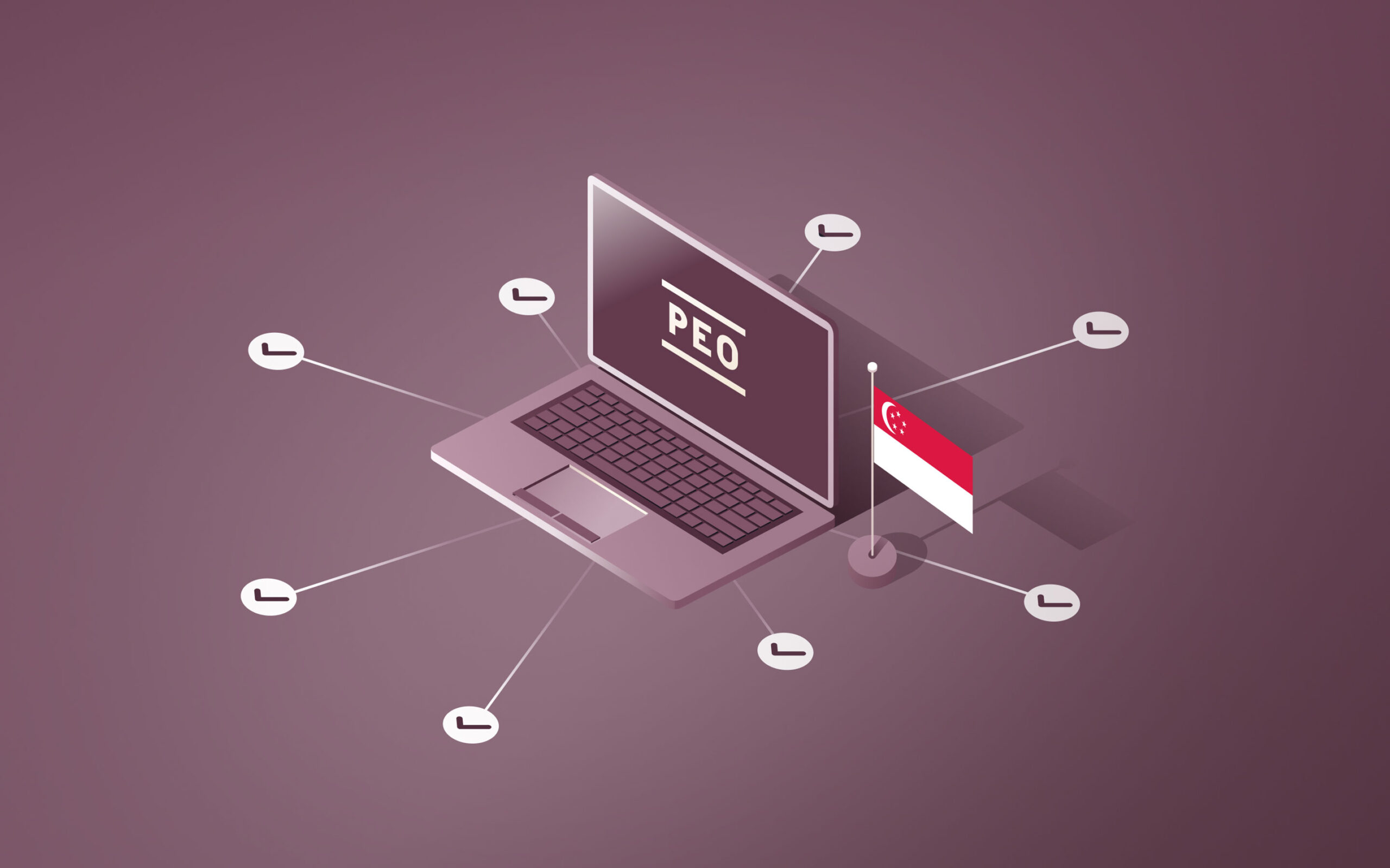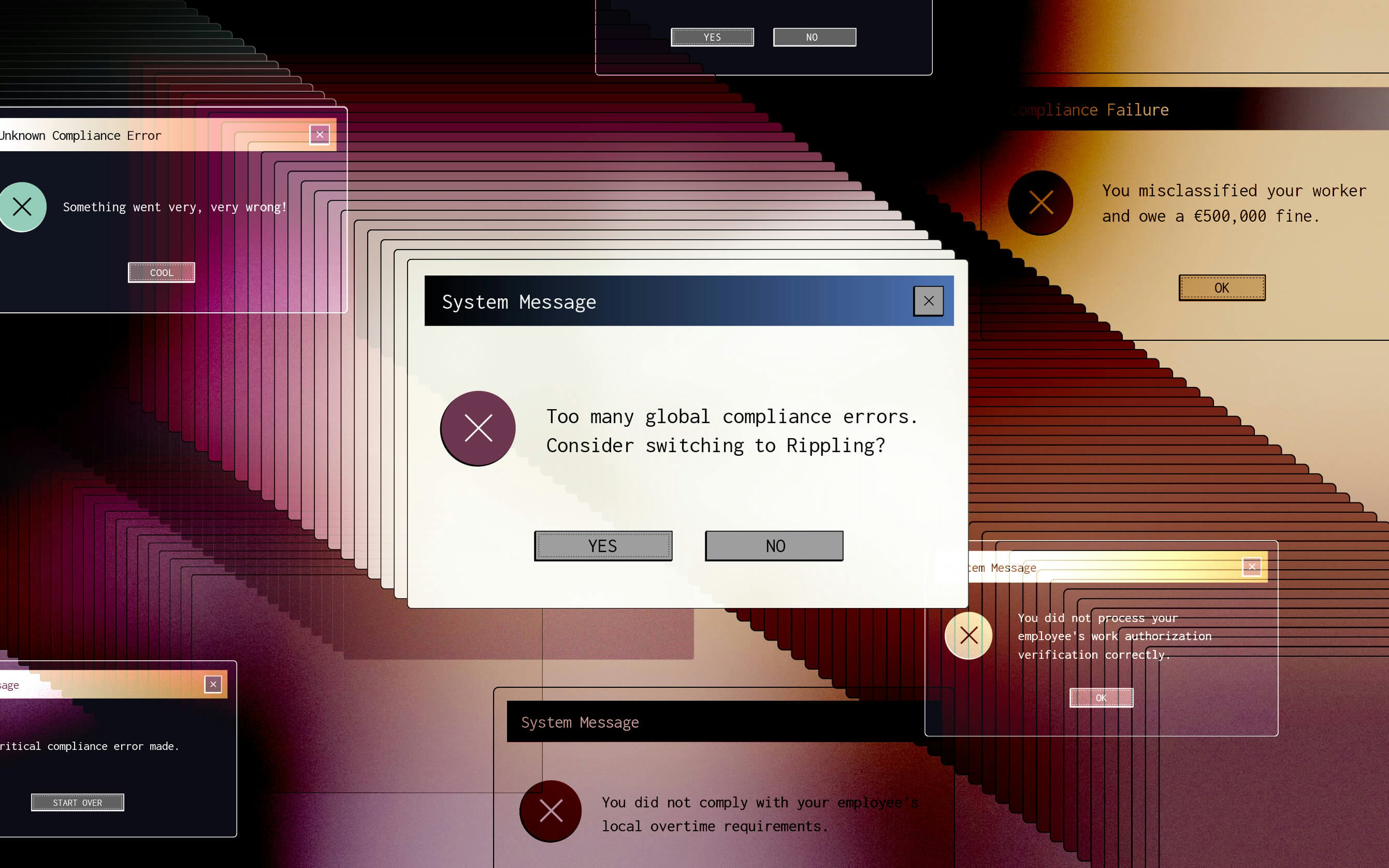Considering a PEO in Singapore? Here’s everything you need to know

Expanding your business into Singapore offers a strategic gateway to the Asian market, thanks to its robust economy, pro-business policies, and advanced infrastructure.
However, hiring employees in Singapore comes with its own set of complexities, including navigating local labor laws, tax regulations, and cultural nuances. One effective way to simplify this process is by partnering with a global Professional Employer Organisation (PEO), also known as an Employer of Record (EOR). Using an EOR in Singapore allows you to hire employees without setting up a legal entity in the country. Here’s everything you need to know about using a global PEO (EOR) in Singapore.
What is a PEO?
A Professional Employer Organization (PEO) is a service that provides human resources solutions to businesses, often including payroll, benefits administration, compliance assistance, and more. In a PEO arrangement, the PEO co-employs its client companies’ workforces. This means both parties share employer responsibilities: You manage the day-to-day operations, like making management decisions and overseeing employee performance, while the PEO handles administrative and HR-related tasks such as payroll processing, benefits, and compliance with employment regulations.
It's important to note that traditional PEO services involving co-employment are primarily applicable to employing US employees. However, the terms PEO, global PEO, international PEO, and Employer of Record (EOR) are often used interchangeably in global employment contexts. In most international scenarios, when companies refer to a PEO, they are actually referring to an EOR, which serves as the legal employer in the foreign country.
PEO vs. international PEO vs. EOR
Understanding the differences between a PEO, international PEO, and an Employer of Record (EOR) is crucial for companies considering global expansion. While these terms are often used interchangeably, they represent different models of service with different implications for your global employment needs.
Professional Employer Organization (PEO)
A Professional Employer Organization (PEO) operates under a co-employment model, most often within the US. In this arrangement, both the PEO and your company share employer responsibilities. The PEO uses technology and its expertise to streamline and automate HR functions like payroll processing, benefits administration, and compliance management, while its client companies retain control over their day-to-day business operations and employee management.
This model is not as commonly used internationally due to varying employment laws and regulations. While you may see some companies advertising Singapore PEOs, they’re most likely actually offering an EOR service and describing it as a PEO, since many businesses are more familiar with the term “PEO.”
International PEO or Employers of Record (EOR)
An international PEO, also called a global PEO or an Employer of Record (EOR), facilitates global hiring by serving as the legal employer on behalf of your company in a foreign country.
The EOR takes on all employment responsibilities, including compliance with local labor laws, tax regulations, and benefits administration. This allows your company to direct the work of the employees without having to set up a legal entity in the country.
In countries like Singapore, this means you can bypass the often time- and resource-intensive process of establishing a local entity and start hiring employees much faster. It also gives your business the freedom to focus on day-to-day work, rather than worrying about the legal complexities of international employment—the EOR takes on that responsibility on your behalf.
Why use a global PEO (EOR) to hire in Singapore?
As a foreign company, you have limited options for legally hiring and paying employees in Singapore. Understanding these options can help you choose the most efficient and compliant method for your business.
Setting up your own legal entity: Complex and time-consuming
Setting up your own legal entity in Singapore involves registering a subsidiary or branch of your company with the Accounting and Corporate Regulatory Authority (ACRA). This process often includes:
- Incorporating your company in Singapore: Choosing a business structure (such as a private limited company), registering your company name, and filing incorporation documents
- Opening a local corporate bank account: Opening a local bank account to handle financial transactions
- Registering for taxes: Registering for Goods and Services Tax (GST) and obtaining a Tax Identification Number with the Inland Revenue Authority of Singapore (IRAS)
- Complying with local laws: Adhering to the Employment Act, which governs labor practices in Singapore, including employment contracts, working hours, leave entitlements, and termination procedures
While establishing a legal entity gives you complete control as a Singaporean employer, it's not always ideal. The process can be time-consuming and resource-intensive, often taking several months to complete. It requires a deep understanding of Singaporean laws and regulations, and without local expertise, your business may face significant compliance risk. Non-compliance can result in hefty fines, legal penalties, or damage to your company's reputation. In short, it can be a hassle. But there’s another way.
Using a global PEO (EOR): Faster, simpler, and less risky
Partnering with a global PEO (EOR) allows you to bypass the need to establish a legal entity in Singapore. Here's how it addresses the drawbacks of setting up your own entity:
- You can enter the Singaporean market faster. A global PEO can help you start operations in Singapore within days or weeks, rather than months.
- It simplifies local compliance. A global PEO manages compliance with local labor laws, tax regulations, and statutory requirements.
- It helps reduce your risk as you expand your global footprint. By helping to handle legal and administrative obligations, a global PEO reduces your exposure to compliance-related risks and liabilities.
Using a global PEO (EOR) in Singapore is a faster, less complicated way to expand your global workforce, allowing you to focus on your core business activities—while the global PEO manages the complexities of local employment on your behalf.
What does an international PEO do?
An international PEO can provide a wide range of services to help streamline and automate various aspects of global expansion and hiring foreign employees. Here's how an EOR can support your business in Singapore:
Employee onboarding
A global PEO (EOR) manages the onboarding process for your Singaporean employees, ensuring compliance with local laws. This can include:
- Drafting legally compliant contracts in accordance with the Employment Act
- Gathering necessary employee documentation, such as identification, tax forms, and work permits or other forms of authorization
- Facilitating a smooth integration of new hires into your company culture and operations
Payroll services
Handling payroll in Singapore means navigating complex tax systems and statutory contributions. A global PEO (EOR) can:
- Process payroll, calculating salaries, overtime, bonuses, and commissions
- Handle tax withholdings, deducting and remitting income tax to the IRAS
- Manage contributions to the Central Provident Fund (CPF), Singapore's mandatory social security savings scheme.
Access to locally relevant employee benefits
Offering competitive benefits is crucial for attracting top talent. A global PEO (EOR) can provide:
- Access to health insurance plans aligned with local expectations
- Administration of annual leave, sick leave, maternity leave, and paternity leave as per Singaporean law
- Options for employee wellness programs, life insurance, employee assistance programs, and other perks
Compliance support
Navigating Singapore's labor laws requires local expertise. A global PEO (EOR) can help your business with:
- Legal compliance, including adherence to the Employment Act and other relevant legislation and helping you stay up-to-date with changes in labor laws and regulations
- Advising on issues like minimum wage, overtime, and notice periods for terminations to avoid wrongful dismissal claims
- Assisting in creating company policies that comply with local regulations
HR outsourcing
By outsourcing HR functions, your team can focus on strategic business initiatives. A PEO provides:
- HR administration to handle staffing, employee records, time-off requests, performance management, and more
- Employee relations, like assisting with conflict resolution and employee engagement initiatives
- Coordinating training and professional development opportunities for staff
What are the benefits of using a Singapore EOR?
Partnering with a Singapore EOR offers advantages that can significantly impact your business success in the region.
Reduced compliance risk
Singapore has strict labor laws and regulatory requirements. Non-compliance can result in severe penalties, including fines and legal action.
An EOR helps by staying updated on local laws and helping to make sure your business’ employment practices adhere to regulations. It also handles many of the statutory obligations that come with running a business in Singapore, like managing CPF contributions and tax filings. Working with an EOR reduces your business’ liabilities and risk of lawsuits or penalties associated with employment law violations.
Time savings
Establishing a legal entity can delay your market entry. But working with an EOR allows you to quickly hire employees in Singapore and start operations promptly by leveraging the EOR's existing infrastructure. The EOR helps you streamline the process—you benefit from the EOR's established systems for payroll, benefits, and HR management. And because the EOR takes so much administrative work off your plate, you get to focus on growth and allocate more time to strategic planning and business development.
Cost savings
Setting up and maintaining a local entity involves significant costs. Partnering with an EOR can be more cost-effective in many cases.
It can eliminate upfront costs of establishing a local business entity, like expenses related to incorporation, office space, and local staff. EORs also often offer predictable pricing, which makes it easier for businesses to budget as they expand. And when it comes to things like accessing local benefits plans, your business can take advantage of economies of scale by purchasing through an EOR, leveraging the EOR's existing relationships and purchasing power for benefits and services.
Local expertise and guidance
Understanding the local market is crucial for success, and an EOR can provide cultural insights to help you navigate business etiquette and workplace norms in Asia—on top of its regulatory knowledge to interpret and apply complex laws and regulations.
On top of this, EORs can offer strategic advice and recommendations on best practices for employee engagement and retention in new places. Their guidance can be invaluable for businesses that don’t have an in-house HR team in the countries where they’re expanding.
How to choose an international PEO
Selecting the right international PEO (EOR) is critical for a successful expansion into Singapore. Consider the following factors:
- Industry expertise: Choose a global PEO with experience in your specific industry.
- Service offerings: Make sure it provides comprehensive services that meet your business needs.
- Technology and ease of use: Opt for a global PEO with user-friendly platforms that integrate with your existing systems.
- Reputation: Research client testimonials and case studies to assess its track record.
- Pricing: Look for transparent pricing models without hidden fees.
Best global PEOs (EORs) for hiring in Singapore
Singapore has many different EOR solutions to choose from. When evaluating your options, it’s important to know what to look for—below, find five of the top EOR services in Singapore and the key features they offer.
Rippling
Rippling EOR was ranked the #1 Employer of Record service in 2023 for payroll processing, compliance management, access to global benefits, and more. But Rippling is much more than a global PEO. When your business partners with Rippling EOR, you get global HR, finance, and IT all in one place—and every part of Rippling is built on a single source truth for employee data, so when you're ready to scale up and establish your own local entity, transitioning your employees to your own entity takes just minutes.
Key features:
- Onboard international employees and independent contractors in 90 seconds
- Pay workers in their local currency in days instead of weeks and without waiting on transfers or conversions
- Automatically file and pay taxes globally
- Streamline and sync all your HR data with payroll, including hours, time off, deductions, and more
- Design worldwide and country-specific policies for employee benefits, leave, and more
- Automate your global compliance work
- Report on all your employee data across the world in one place
- Manage human resources, IT, and finance in one unified system for global employment
Papaya Global
Papaya Global’s EOR is built for large enterprises, offering hiring, onboarding, workforce management, multi-currency payments, and benefits administration around the world. It also offers HR services and payroll for both employees and independent contractors.
Key features:
- Automated payroll
- Safe, simple, and fast global payments (in local currency or crypto)
- Integrations with HRIS, expense management, time and attendance, ERP, and financial software
- Dedicated customer success representative
Deel
Deel is a well-known EOR that offers HR support and services for businesses looking to expand their global footprint without establishing their own local entities.
Key features:
- Onboarding and offboarding
- App management
- Compliance management
- Streamlined payroll
- Integrations with other HR platforms
Remote
Remote is an EOR service provider geared mostly toward remote teams and employers of remote workers, with HR, payroll, and benefits features in a modern platform.
Key features:
- Payroll with no interchange fees
- Benefits management
- IP protection
- Self-service onboarding
Oyster HR
Oyster HR promises to handle all the details related to global hiring, so you can focus on hiring top talent. Its EOR offers hiring, compliance, payroll, and benefits support around the globe.
Key features:
- Document management
- Global payments in local currencies
- Localized benefits packages
- Dedicated customer service for enterprise users
Hire in Singapore quickly and compliantly with Rippling
From compliance to payroll to onboarding and more, Rippling automatically handles the hard parts of hiring in Singapore and around the world.
With Rippling EOR, you can:
- Onboard in minutes. Hire and onboard Canadian employees to maximize productivity on day one. Rippling handles everything from benefits enrollment to assigning required trainings.
- Pay locally in days—not weeks. Pay all of your employees in Canada—and around the world without delay. Rippling does the calculations and money movement for you. You’ll be free to focus on what matters.
- Automate global compliance. Double-checking compliance risks takes time. Rippling runs securely in the background, continuously flagging potential risks.
- Unify HR, IT, and finance. Data entry and duplicate systems waste time. Every team has one source of employee data, so speedy automation can take on manual work.
Frequently asked questions about Singapore EORs
Still have questions about partnering with an EOR service to expand your global footprint in Singapore? Learn more in the FAQs below.
What’s the difference between a PEO and an EOR?
While Professional Employer Organizations (PEOs) and Employers of Record (EORs) both offer solutions to streamline HR functions and facilitate international hiring, they operate under different models.
A PEO engages in a co-employment relationship with the client company, most often in the US. In this arrangement, both the PEO and the client share employer responsibilities: The PEO manages HR tasks like payroll, benefits administration, and compliance, while the client oversees daily operations and employee management. In some countries, a PEO may function as a "paymaster" for the client, handling payroll processing without taking on full legal responsibility for the employees. However, this model requires that both the PEO and the client have local entities in the country where the employees are based.
An EOR, on the other hand, becomes the full legal employer of your staff. The EOR assumes all employer responsibilities, including compliance with labor laws, payroll processing, benefits administration, and tax obligations. This model does not require your company to have a local entity in the country. By using an EOR, your company can direct its employees' work without the need to establish a local entity or navigate complex legal requirements. An EOR may also be referred to as a global PEO or an international PEO.
How does using an EOR affect my company's control over employees in Singapore?
Using an EOR allows your company to maintain full control over the day-to-day management and operations of your employees in Singapore. While the EOR handles legal employment responsibilities—such as payroll, benefits, and compliance—you direct the employees' work, set their schedules, and make decisions related to their roles. The EOR does not interfere with your managerial authority but supports you by handling administrative and legal obligations.
Can I transition from an EOR to setting up my own entity in Singapore later on?
Most EOR providers make this a difficult process. If you use Rippling, you can quickly and seamlessly move between an EOR and your own entity as needed, without losing access to your employees’ logins or data.
This blog is based on information available to Rippling as of October 29, 2024.
Disclaimer: Rippling and its affiliates do not provide tax, accounting, or legal advice. This material has been prepared for informational purposes only, and is not intended to provide or be relied on for tax, accounting, or legal advice. You should consult your own tax, accounting, and legal advisors before engaging in any related activities or transactions.








